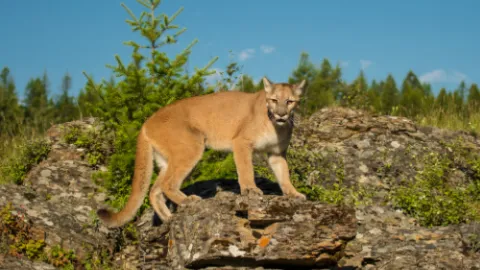Living with wildlife - Mountain Lion
Mountain Lions are the second largest cat in the Americas. They are closely related to the domestic cat even in the way they purr. They live in many different environments such as the swampy areas of Florida, desert areas, mountain ranges, and forests throughout the Americas and Canada. In California, mountain lion habitat covers more than half of the state. Mountain lions are elusive and solitary animals, which by their nature, avoid humans whenever possible. Many people are surprised to see them in cities or roaming around neighborhoods, but as human population increases, so does housing and development - leading to the destruction of land and their habitat. As we move into their habitat, wildlife must adapt to survive.
Many wild animals, some which are a part of a mountain lions' diet, have adapted to making urban areas their home. A mountain lion's diet consists mainly of deer, but the cats are also known to eat wildlife that many people consider to be "nuisance" animals or "pests" such as raccoons, coyotes, rodents, rabbits, opossums, skunks, etc. Domestic animals are not a part of their diet, but if an opportunity to satisfy their hunger arises, they will take it. Keeping your pets indoors when mountain lions are mostly active (dawn, dusk and at night) and not leaving them outside unattended can prevent mountain lions from taking your pet. Also, keeping your dogs on a leash will prevent this as well! Don't leave pet food outside since this attracts mountain lion prey.
Bobcats are often mistaken for mountain lions. However, they are smaller than mountain lions and have short tails. Their ears appear to be pointed at the tip. Bobcats sometimes will have a spotted coat that is brown in color or gray. Mountain lions, on the other hand, have a long tail that appears to drag on the ground. Their ears are rounded, their coat is light brown and they are much bigger than the bobcat.
Mountain lions are part of our ecosystem. They help keep our ecosystem in balance. They also help shape the environment by keeping the number of herbivores under control. If herbivores increase, vegetation will decrease. By coexisting with mountain lions, we help keep our ecosystem alive and well.
If you spot a mountain lion or one with unusual behavior, call Mission Viejo Animal Services at 949-470-3045 or the Sheriff's Dispatch at 949-770-6011. You can also call Cal Tip line at 888-334-2258.

